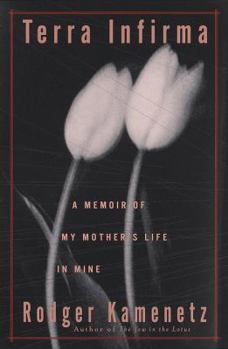Terra Infirma : A Memoir of My Mother's Life in Mine
Select Format
Select Condition 
Book Overview
Ter'ra in'fir'ma, n. 1. Shaky ground. 2. The uneasy shared territory of love and painful separation that defines mother and son. 3. The border between life and death. 4. The precariously emotional... This description may be from another edition of this product.
Format:Hardcover
Language:English
ISBN:0805241671
ISBN13:9780805241679
Release Date:December 1998
Publisher:Schocken
Length:128 Pages
Weight:0.50 lbs.
Dimensions:8.5" x 0.8" x 5.5"
Related Subjects
Arts & Literature Authors Biographical Biographies Biographies & History Biography & History Criticism & Theory Death & Grief Family Relationships Grief & Bereavement Health Health, Fitness & Dieting Health, Fitness & Dieting Historical History & Criticism Literary Criticism Literary Criticism & Collections Memoirs Men Movements & Periods Parent & Adult Child Parenting & Relationships Politics & Social Sciences Religion & Spirituality Social Sciences SpiritualityCustomer Reviews
2 ratings
Child of Silence
Published by Thriftbooks.com User , 23 years ago
After the end of WWII, the term "children of silence" has been used to refer to children brought up by parents who had traumatic experiences and decided to remain silent with respect to the past. Children brought up in this silence invariably have problems in facing reality; silence creates a void in their lives they desperately seek to understand (refer to "Apples from the Desert," by Savyon Liebrecht). Rober Kamenetz, (poet, author of "The Jew in the Lotus) is also a victim of silence, and as a poet his book "Terra Infirma" represents his cathartic, emotional battle to untangle this issue. In a style that is both lyrical and poetic, Kamenetz writes a sad, tragic story, filled with anger, regret, and love.His mother, Miriam Kamenetz, refuses to speak of her past until the last stages of her illness. Granddaughter of Jewish immigrants, her mother died in a mental institution, her father abandoned her in the hands of relatives, and eventually she was sent to a foster home. Upon a successful marriage, she is determined to erase her past, to place mind over matter. She becomes a fierce, willful mother, with a passionate love, channeling all her aspirations through her children. This love suffocates the author in a metaphorical umbilical cord that is only cut with her death. Poetry becomes the refuge in this shaky (terra infirma) relationship between mother and child. The tension reaches its climax when the author confronts his mother through dreams, submerging him in a Freudian dream analysis. Kamenetz's purpose in his book is to write about death of a loved one without being sentimental, as a healing and spiritual process. If Kamenetz saw his mother's sadness as "a song without lyrics," he has certainly given lyrics to her song, showing that his mother's all-embracing love bears a reciprocal love from her son.
"a powerful memoir"
Published by Thriftbooks.com User , 25 years ago
From New Orleans Times Picayune January 24, 1999 SONGS FOR MY MOTHER by SUSAN LARSON Book editor Poet Kathleen Fraser wrote, "One hears one's childhood and it is ancient." So adults repeat the patterns of the past, haunted, dreaming, often grieving, as childhood echoes reverberate through hearts and minds. In his powerful memoir of his mother's life, Terra Infirma, poet and teacher Rodger Kamenetz has crafted a sad and enduring tale of mothers and sons. He begins with his mother's dying of cancer at age 54. Her last words were, "I love you." He writes, "Her dying words were a triumph. They hold me still in their grip." Haunted by dreams after her death, Kamenetz began to unravel the mysteries of his mother's life. The granddaughter of Jewish immigrants, Miriam Kamenetz rarely spoke of her painful past. After her mother was committed to a mental institution following two failed marriages, Miriam was shuttled among relatives, abandoned by both parents, finally ending up in a foster home. Determined to control her own life, she developed "a fierce drive. It was all mind over matter, will over circumstance." When she made her successful marriage, she never discussed her past, never told her children about her own life until she was near death. When she developed colon cancer, her pride played a part in her eventual death. Like any child of a willful, powerful parent, Kamenetz sought escape - both geographical and mental - and refuge in poetry. Later, when he has his own children, Kamenetz watches his young daughter learn the meaning of the world 'no': "She loved to say it. Do you want to eat? No. Do you want to get dressed? No. Do you want to go to sleep? No. (She doesn't even know how to say yes.) Do you want not to go to Charles's? No. We thought we had her trapped. But No knows no metaphysical corners.. No is not a simple refusal. It is a place of creation. And so she practiced it by herself. Nobody had asked her any questions, but she still sang it, No, NO NOOO. She was building a world of it. "All my life I too have been learning the meaning of the word No. Like Anya, I have built a world of it. I believe that my mother's strange secrecy, her silence, is what got me interested in poetry. For poetry is the meaning of the word No. "Everything absent inspires poetry. Everything absent inspires new names. That is why poets court absence. The most beautiful rose, Mallarme wrote, is the rose absent from all bouquets." Out of the absences in his mother's life, and out of her absence and presence in his own life, Rodger Kamenetz has created a beautiful grief-filled prose poem of love and loss. From terra infirma, that shakv ground, he leads his reader to higher ground. Like his mother, he can be fierce, even as he seeks to do the one thing she could not do far herself, recapture and understand her past.





